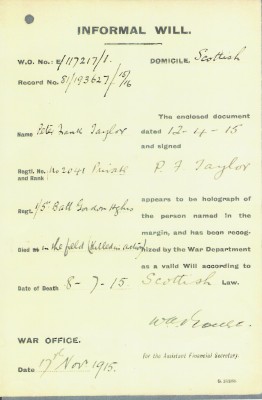
Informal wills are wills which do not satisfy the formal requirements of execution under section 8 of the Wills Act, 1936. For information as to the legal requirements to create a valid and binding will see our article ‘Proper Execution and Witnessing of Will is Vital‘.
Requirements for a Valid Will
In South Australia, a will or other testamentary document (such as a codicil) will not be considered valid unless:
- It is in writing;
- It is signed by the testator;
- The testator signs the document in front of two witnesses all present at the same time; and
- The witnesses sign the will in the presence of the testator.
Court has Power to Admit Informal Wills to Probate
There are however, circumstances in which the Supreme Court will hold a will valid, notwithstanding that it does not comply with the formal requirements of execution under the Act. The Court has the power to admit an informal will to probate if it is satisfied that:
- The document expresses the testamentary intentions of the deceased person; and
- The deceased person intended the document to constitute his or her will.
In short, the Court needs to be satisfied that the deceased intended the document to dispose of their property and that they intended such disposal to take effect only upon their death. A document does not have to be expressed, on its’ face, to be a will.
Indicators that Document Intended as Will
Indicators that a document may have been intended to be a person’s last will include:
- Words which suggest that the deceased intended to give their property away such as “I give”, “I bequeath” or use of the word “beneficiary”, or the phrase “my estate”;
- The appointment of executors;
- The document having been signed and/or dated by the deceased; and
- The document having been witnessed.
However, such indicators alone will not be enough to satisfy the Court that an informal will should be admitted to probate. The Court will also examine other evidence to determine whether the deceased intended the document to be their final will. In addition to the terms of the document itself, this may include evidence of conversations the deceased had with other persons around the time the document was made, the manner in which the document was created, where the document was found and any knowledge the deceased may have had about the formal requirements for making a will.
Examples of Informal Wills
There have been cases in Australia where informal wills such as entries in a patient’s hospital records, suicide notes, post-it notes, iPhone notes, computer files, audio recordings, a half burnt hand written will and DVD recordings have been admitted to probate. However, this is by no means a simple exercise. An application to admit an informal will to probate is invariably far more complicated, time consuming and expensive than a standard application. Generally such grants of probate must be made in solemn form and require a significant amount of evidence including often, forensic evidence. If a family member or loved one has left what you believe may be an informal will, it is imperative that you take expert legal advice as soon as possible.
Such complications are of course easily avoided through the making of a well drafted valid will.
For further information please contact Michelle Crichton on 8362 6400 or email Michelle Crichton. Join our mailing list to receive updates and advice on current issues.







